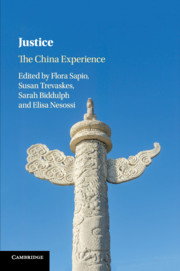Book contents
- Justice
- Justice
- Copyright page
- Contents
- Contributors
- Part I Constructing the Idea of Justice
- Part II The Performance of State Justice
- Part III Expressing Justice in the Public Arena
- 8 Justice in the PRC
- 9 Justice, Wrongs and Rights
- 10 Perceived Justice of Migrant Workers in China
- Part IV Justice in Action and Law
- Index
- References
10 - Perceived Justice of Migrant Workers in China
from Part III - Expressing Justice in the Public Arena
Published online by Cambridge University Press: 02 August 2017
- Justice
- Justice
- Copyright page
- Contents
- Contributors
- Part I Constructing the Idea of Justice
- Part II The Performance of State Justice
- Part III Expressing Justice in the Public Arena
- 8 Justice in the PRC
- 9 Justice, Wrongs and Rights
- 10 Perceived Justice of Migrant Workers in China
- Part IV Justice in Action and Law
- Index
- References
- Type
- Chapter
- Information
- JusticeThe China Experience, pp. 257 - 282Publisher: Cambridge University PressPrint publication year: 2017



